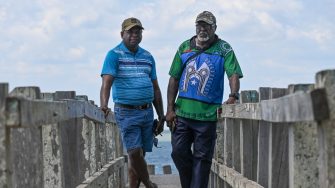
As world leaders gather in the UK for the COP26 climate change summit, the Australian Government is being pressured to strengthen its climate change targets.
Now a new climate case looks set to add to that pressure.
Two Traditional Owners from remote islands in Gudamalulgal in the Torres Strait have taken the Commonwealth Government to court in a bid to prevent the destruction of their communities by climate change.
Wadhuam Paul Kabai and Wadhuam Pabai Pabai, from the islands of Saibai and Boigu, are arguing that the Commonwealth has a duty of care to ensure Torres Strait Islander Peoples are not further harmed by climate change. (Wadhuam is a Gudamalulgal honorific meaning ‘Maternal Uncle’.)
The case, which is supported by UNSW Law School partner Grata Fund, is the first climate class action brought by First Nations Peoples in Australia.
The frontline of the climate crisis
While many of us are only now starting to feel the effects of global warming, people in the Torres Strait have been living with the crisis for years. With sea level rising, sea water has already begun to inundate infrastructure and cultural sites. Homes are being flooded, and gardens are being drenched with salt water, making it harder for people to grow vegetables to feed their families.
“Our ancestors have lived on these islands for more than 65,000 years. But the Government’s failure to prevent the climate crisis means our islands could be flooded, our soils ruined by salt and our communities forced to leave. We have a cultural responsibility to make sure that doesn’t happen and to protect Country and our communities, culture and spirituality from climate change,” says plaintiff Paul Kabai.
Torres Strait Islander Peoples have shown incredible resilience, even as the waters rise around them. But that cannot go on forever. Like people from other low-lying islands, people living in the Torres Strait face an existential threat from climate change - a threat that is driven by the continued burning of coal, oil and gas.
If urgent action is not taken to reduce greenhouse gas emissions, sea levels are forecast to rise by up to metre by the end of the century. Some islands in the Torres Strait will become uninhabitable. This would cause devastating harm to Torres Strait Islander Peoples and sever their connection to 65,000 years of culture and knowledge, which the plaintiffs in this case say would be a cultural genocide.
“I can’t imagine being forced to leave Boigu because this island is me and I am this island. There are 65,000 years of wealth and experience here. Losing Boigu will mean losing that. If you take us away from this island then we’re nothing. It’s like the Stolen Generation, you take people away from their tribal land, they become nobodies,” says plaintiff Pabai Pabai.
Pabai and Paul’s case
Pabai and Paul are arguing that the Australian Government has a legal responsibility not to harm the people, islands, and culture of the Torres Strait. This arises from the common law of negligence, the Torres Strait Treaty, and the Native Title rights of Torres Strait Islander Peoples.
By failing to prevent climate change, the Australian Government has unlawfully breached this duty of care, because of the severe and lasting harm that climate change would cause to their communities.
Net zero by 2050 - too little, too late
The Australian Government has just set a 2050 ‘net zero’ emissions target, which experts say will not be enough to prevent disaster in the Torres Strait.
In fact, leading climate scientists who form the Climate Targets Panel calculate that Australia’s greenhouse emissions need to be reduced by 74% by 2030 (from 2005 levels) and to net zero by 2035 to keep global heating to below 1.5C and avert the destruction of Torres Strait Islander communities.
Paul and Pabai are seeking an order from the court that requires the Federal Government to take steps to prevent further climate harm to their communities by cutting greenhouse gas emissions. While a decision is some way off, if this case is successful it could change forever how Australia responds to climate change and the harm it is causing to Australian communities.
